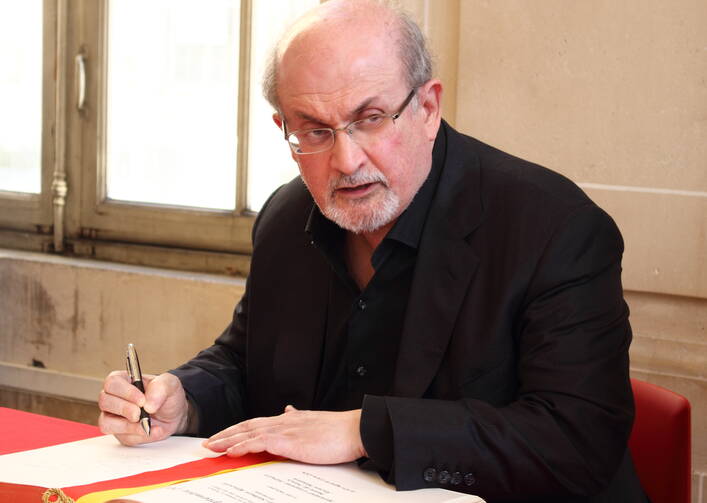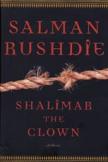The Political Is Personal
Always try to do too much must be taken as one of Salman Rushdie’s mantras, and he certainly lives up to it here. This sprawling story flashes back and forth from pre-World War II Strasbourg to present-day Los Angeles, touches at least fleetingly on every major world crisis from the Holocaust to 9/11, presents a gigantic cast of characters who speak Kashmiri, Hindi, Urdu, Arabic, French, German and several dozen dialects of English, mixes Indian and Pakistani folk arts, religion, terrorism, diplomatic history, alienation, lust and betrayal in a series of wild explosions that reverberate till the very last sentence. It is way over the top and it’s enthralling.
This whirling dervish dance of a tale does have a center, and it is the apparently hopeless ongoing catastrophe (tragedy is too aesthetic a term) of post-partition Kashmir, the homeland of Rushdie’s maternal grandparents. One of the most stunningly beautiful places on earth, Kashmir’s modern woes began in 1947 when its ruler, the Hindu Maharaja Hari Singh, signed over the region, with its Muslim majority, to the newborn state of India. Since then, Jammu and Kashmir, as it is officially known, with a population currently around eight million, has degenerated from a modestly harmonious multicultural paradise into a fratricidal hellwith at least 1 percent of its inhabitants slaughtered in just the last 15 years. There has been unspeakable cruelty on both sides, though Rushdie, while recounting the methodical rapes, murders and burnings by the Indian army, seems more horrified by the fanatical Islamic militants. It is not exactly an evenhanded approach, but hardly a surprise, given the Iranian fatwa that nearly ended the novelist’s life.
Noman Sher Noman (thank you, James Joyce), a.k.a. Shalimar the clown, is a brilliantly gifted Muslim acrobat who falls in love with the intoxicating Hindu dancer Boonyi Kauland marries her in a rather too utopian scene of conviviality in their native village of Pachigam. But Boonyi wants to escape the narrow confines of home and is only too ready to accept a seductive hint from the visiting American ambassador to India, Max Ophuls (a Jew, but no relation to the famous homonymous director) and run away to Delhi, where she becomes his mistress. After a year or so the affair sours (Ophuls is married to a bitterly passive-aggressive and infertileEnglish wife, soured by his nonstop infidelities), and the ravishing Boonyi turns into a bloated drug addict; but she manages to get pregnant just before being dismissed. Margaret Ophuls snatches away the baby for herself and ships Boonyi back home, where she is treated quite literally as a dead person and banished to a lonely hut in the mountains. Shalimar has temporarily vowed not to kill her, but their marriage is over.
The mixed-race girl, India Ophulsas ravishing as her mother is raised in Britain, Switzerland and the United States. After a miserable adolescence, she is reconciled with her father (fired from his ambassadorship when word of his affair leaks out), and is about to settle down with him in something like belated family bliss in a southern California mansion, when Shalimar, who has since become a ruthless jihadi killer, lands in America and butchers his wife’s lover (the time limit on his vow has expired, so he has also beheaded his adulterous wife). Though eventually arrested, tried, condemned to death and locked up in San Quentin, Shalimar has also vowed to slay his step-daughter, and sets out to do so in the spectacularly melodramatic concluding pages of the book. But India, who has now renamed herself Kashmira after a heart-breaking trip to Pachigam in search of her mother, is as lethal a warrior as Shalimar.
In the genre of magic realism, both normal psychology and verisimilitude take a back seat to dizzying plots and dazzling stylistic pyrotechnics; and no Rushdie fan will be jolted by the goings-on here. For instance, just before his death Max puts in a guest appearance on The Tonight Show, where he discards his fabled Old World charm and delivers a tormented harangue on the nightmarish horrors in Kashmir, which bores the American audience to tears and gives a sharp, ironic flavor to his assassination by a Kashmiri militant shortly afterwards.
Rushdie himself is preaching throughout Shalimar the Clown despite, and precisely by means of, the eruptions of exotic color in his loving catalogues of Kashmiri legends, food, dress, folklore and so on. And just when his mind-boggling, omniscient cosmopolitanism, ventriloquist’s genius and ultra-hipness threaten to devolve, or dissolve, into mere display, Rushdie gets back to the grim bedrock of history and his own anger over it. The Rushdie who jokes about the absurdly blond ’n’ bland hunk of a California underwear model who woos India shifts to the Rushdie who indignantly sums up the demented values of Shalimar: Honor ranked above everything else, above the sacred vows of matrimony, above the divine injunction against cold-blooded murder, above decency, above culture, above life itself.
In a superb review in The New York Review of Books (10/6/05), Pankaj Mishra takes Rushdie to task for any number of political oversights and misreadings in Shalimar. The anti-India insurgency, he notes, largely grew out of the thwarted Kashmiri desire to embrace the modern’ what Rushdie himself exhorts Muslims around the world to do in his frequent articles and speeches and was not dominated by jihadi Islamists until the mid-1990’s. Point taken. But Mishra ignores what makes Rushdie one of the great contemporary writers: his galloping imagination and his nearly irresistible narrative flow. He takes the grand abstractions of politics and gives them a terribly local habitation and an unforgettable name. He may be too controversial to win the Nobel Prize anytime soon, but he is too powerful not to read right now.
This article also appeared in print, under the headline “The Political Is Personal,” in the February 13, 2006, issue.









